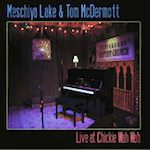In a city known for its larger-than-life musical personalities, Tom McDermott strikes a serious figure. Not so much in his playing, which has its moments of wit and whimsy, but in his general demeanor and in his encyclopedic knowledge of the traditions he’s plumbed. From the withering exercise of All the Keys and Then Some to his meticulous explorations of James Booker, his groundbreaking investigations into the relationship between New Orleans and Brazilian music and his earnest championing of underrecognized players, McDermott teaches as much as he entertains.
That doesn’t mean McDermott isn’t fun to listen to. Some of my most enjoyable listening experiences in New Orleans have been McDermott’s duets, the subject of a wonderful record a few years back. McDermott is a great listener and accompanist who always brings out something special in a partner. One of the more revelatory exchanges I saw at Snug Harbor was McDermott with Meschiya Lake, fresh from her work on Royal Street with Loose Marbles. Then, she seemed shy as she sang and tap danced while McDermott encouraged her. Lake has grown as an artist in the ensuing years, and on this duet gig with McDermott at Chickie Wah Wah, she’s a full-fledged star.
McDermott is in subtle control of the proceedings, playing a dazzling solo deconstruction of “Maple Leaf Rag,” the beautiful “No Me Toques” and the tour de force “Proezas do Solon.” He frames Lake’s sultry voice on a wide range of material, from a sprightly rendition of “Hey Good Lookin” to the moody, introspective “Gloomy Sunday.”
Unlike many current young divas, Lake is not basking in the reflected retro glory of the big band “canaries” of yesteryear. She brings something of her own to such period pieces as “I Wonder Who’s Kissing Her Now,” “Marie” and “I Got It Bad (and That Ain’t Good).” Lake is undaunted when she takes on such staples as the gospel standard “Just a Closer Walk with Thee” and Bessie Smith’s “Backwater Blues.” Just as McDermott is fearless in reframing familiar melodies and harmonies, she has the scope and imagination to personalize the material, no matter where it comes from. In the intimate confines of Chickie Wah Wah, that translates to sheer fun.





